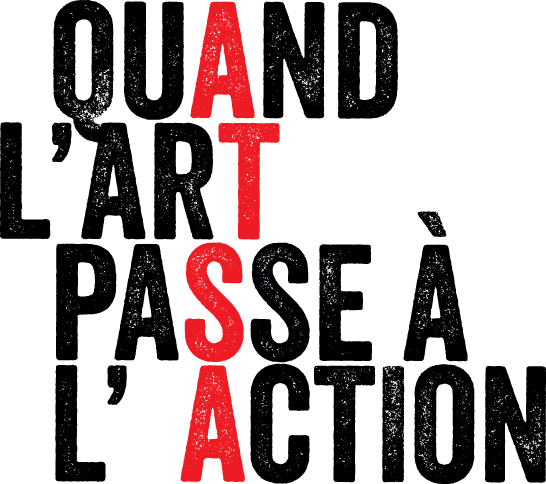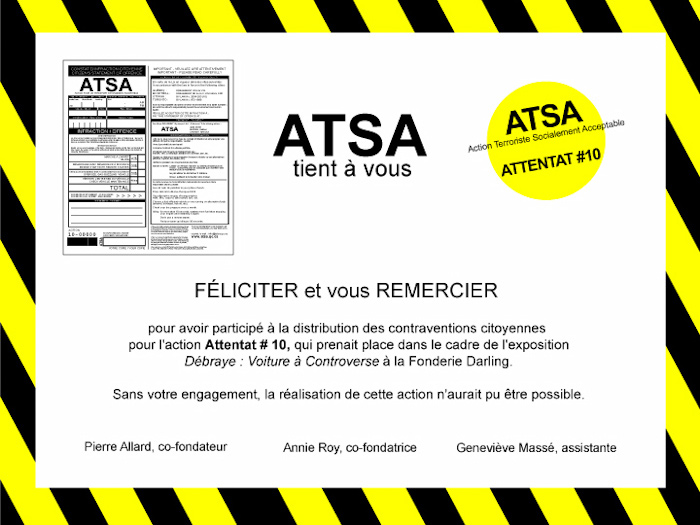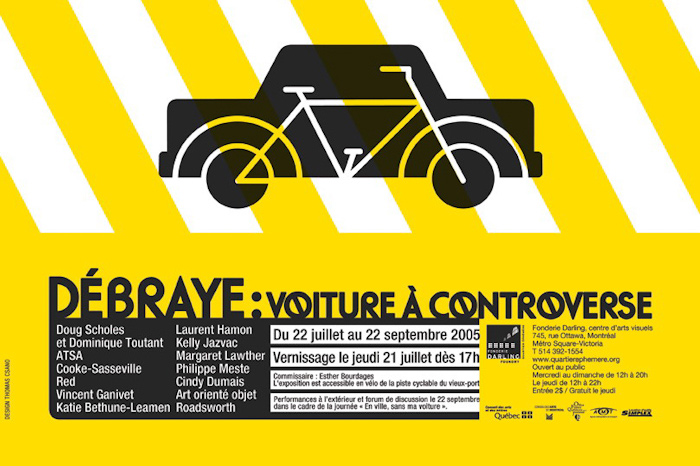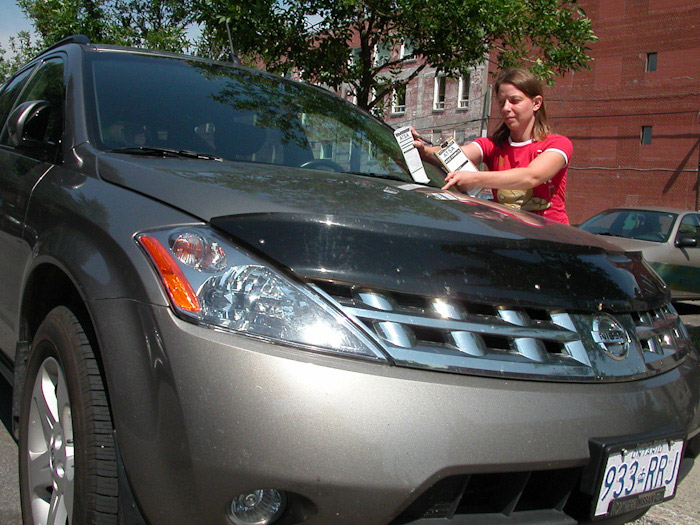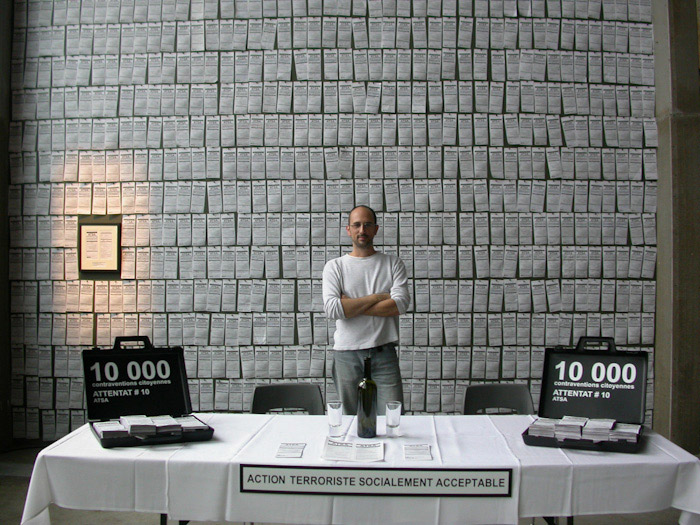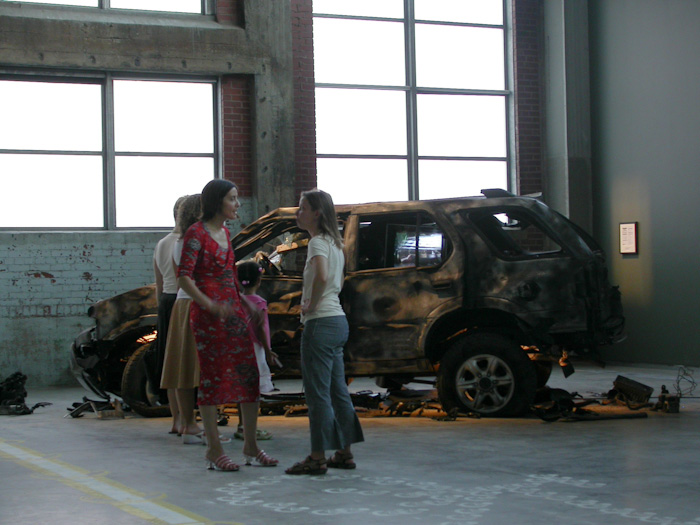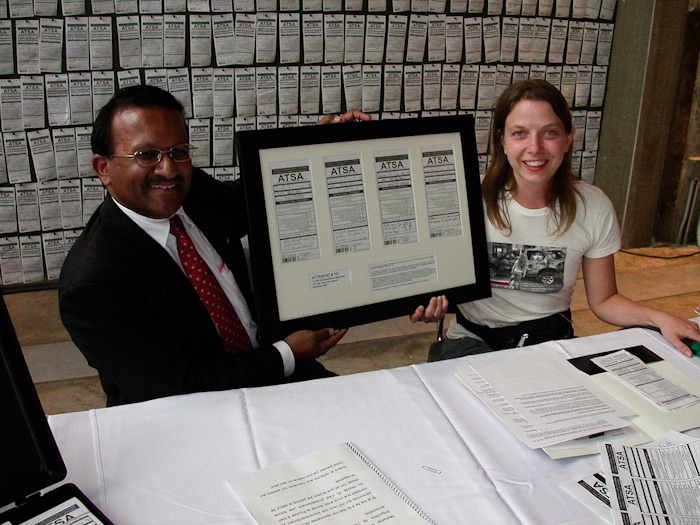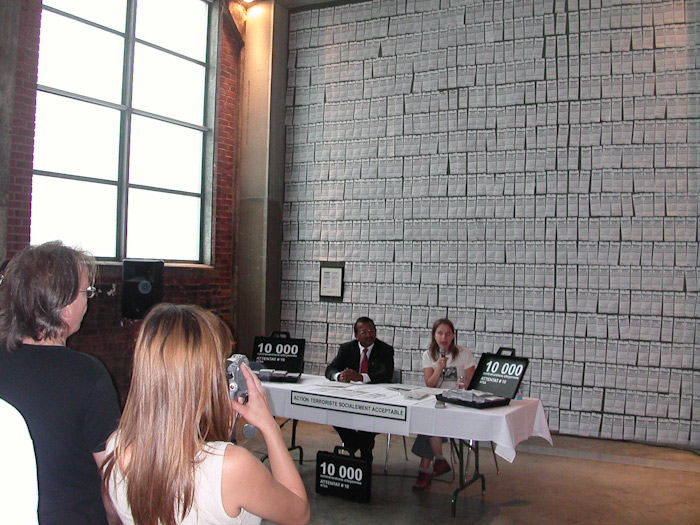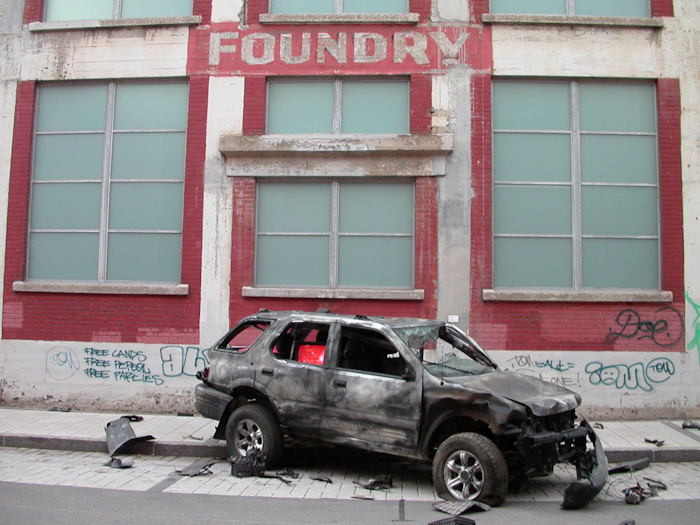Project I Pan-Canadian action I Attacks # 12-13-14-15
From August 15 to September 22, 2005, nearly 350 “patrollers” recruited by ATSA issued some 10 000 statements of offence. These statements targeted oversize vehicles with excessive fuel consumption, excessive engine idling, remote engine starters and poorly maintained vehicles.
Individually numbered and in triplicate, the statements of offence were created as part of the Débraye : voiture à controverse event. Each statement was issued to a vehicle in violation, and all were exhibited at the Darling Foundry, where they were symbolically hand-delivered to Mr. Alan De Sousa, member of the Executive Committee of the Ville de Montréal and responsible for economic development and sustainable development, on the occasion of the En ville sans ma voiture! event held September 22. Through this action, ATSA has created a tool for raising citizen awareness. ATSA demands regulation in order to protect Montrealers’ quality of life.
» Read the project assessment of Attack # 10
photos
video
Delivery of 10,000 statements of offence
As part of Débraye : Voiture à Controverse organized by Quartier Éphémère at the Darling Foundry.
Thursday, September 22, 2005, day of the ' En ville sans ma voiture ' ! (In Town, Without My Car ! ) event.
4 P.M. at Darling Foundry, 745 Ottawa St.
Montreal, Thursday, September 22 - ATSA invites all media representatives and the general population to the symbolic handing over of the 10,000 individually-numbered statements of offence to Mr. Alan DeSousa, member of the Executive Committee of the Ville de Montréal and responsible for sustainable development and economic development.
This conference is open to the general public and will take place inside the Foundry’s large hall, next to the exhibit of the 10,000 statements of offence. ATSA will assess the impact of the controversial event and then formulate specific demands. A prize will be awarded to the patroller having most distinguished himself or herself.
ATSA will take the opportunity to launch its new Pan-Canadian Action !

OUr demands
After warmly thanking the “patrollers” and awarding a prize to the patroller having most distinguished himself, ATSA then put into perspective the degradation of the quality of air according to the BAPE and RSQA reports (it was the 26th day of smog in Montreal, and we witnessed a 50% increase in the number of days with poor air quality with respect to 2003), offered an update on the follow-through after the meeting of the signataries to the Kyoto Protocol, and provided a glimpse of what to expect at the 11th United Nations conference on climate change to be held next November 28 to December 9.
While recognizing the great financial needs of our cities, ATSA questions the financial dependence of the municipalities upon the gasoline tax and proposes regulation of automobile use that will likely have positive repercussions on both the environment and urban safety:
- Enable parking officers to issue statements of offence for engine idling.
- Abolish remote engine starters.
- Quintuple the fees for reserved parking stickers for vehicles whose consumption exceeds 15 liters per 100 km of city driving.
- Eventually issue special permits for people who wish to drive such vehicles in the city.
- Prohibit taller vehicles such as 4x4’s and SUV’s from parking at street corners and thereby reducing visibility for smaller vehicles, cyclists and pedestrians.
- Create political pressure so that any print advertising for automobiles includes a black strip of technical information related to fuel consumption for city driving and greenhouse gas emissions produced per 20,000 km of distance traveled.
- Establish more pedestrian-friendly zones where motor vehicles are not the uncontested rulers, in order to create less stressful and less noisy living areas.
- Develop public transit that effectively meets the challenges of urban sprawl with rapid trains, particularly for suburban routes with frequent stops.
And while we’re at it, might we suggest to the Ville de Montréal that it create a statement of offence that requires less paper (see Ottawa’s system): isn’t it about time we moved on to electronic statements ?
Notice to the media and the public
Dear Offenders : keep on smiling !
You are not legally bound to pay your statement of offence. However, if you wish to show that you have a sense of humor, and if your finances allow (some of you have vehicles that prove that!), we will invest your donation back into ATSA in order to keep spreading the word through more Socially Acceptable Terrorist Actions!
A big thanks to all our patrollers !
Project Assessment
All the statements printed were issued. Our goal of issuing 10,000 statements was met, thanks to our 350 volunteer patrollers, aged 13 to 82, who successfully put across the message that the environment must be a greater priority than our desire for power and comfort.
ATSA has received hundreds of e-mails supporting our initiative, clearly demonstrating that people want action!
There were no physical altercations nor any incidents of vandalism to report. ATSA does not condone any act of vandalism or violence.
The statement was realistically done up but ATSA never expected people to turn up at their local municipal court or police station. We remedied the situation by stamping the amount “0” in the statement’s Total box.
ATSA received many e-mails from people wanting to justify their choice of owning a large vehicle: large family, used for delivery, used for pulling a boat, not that large, and so on. Some were angry, others were insulted that we were judging their choice. Dialogue was encouraged, as it was a major component of the project.
When all is said and done, our statement of offence remains a peaceful tool taking aim at the choice of vehicle and its use. It seeks to confer a voice to those citizens who do their daily share to improve the quality of our air, and in so doing move beyond the status quo.
As long as there is no regulation of the consumption and use of polluting vehicles, citizen reaction will assuredly warm up along with the planet.
Education will always be crucial, but no true plan for sustainable development can be effective without some clear incentive. The spike in gasoline prices shows this clearly. Habits change when wallets are pinched. So it would be with regulation: if you develop proper habits, your wallet will stay intact and everyone wins!
According to many researchers, including Ray Tomalty, Director of CORPS and professor at McGill University’s School of Urban Planning, “a plan relying solely on the good will of taxpayers has little hope of bringing about truly sustainable urban development.” ( “The experts weigh in on the Ville de Montréal’s strategic plan for sustainable development,” page 6, September 3, 2005 issue of Place Publique.)
